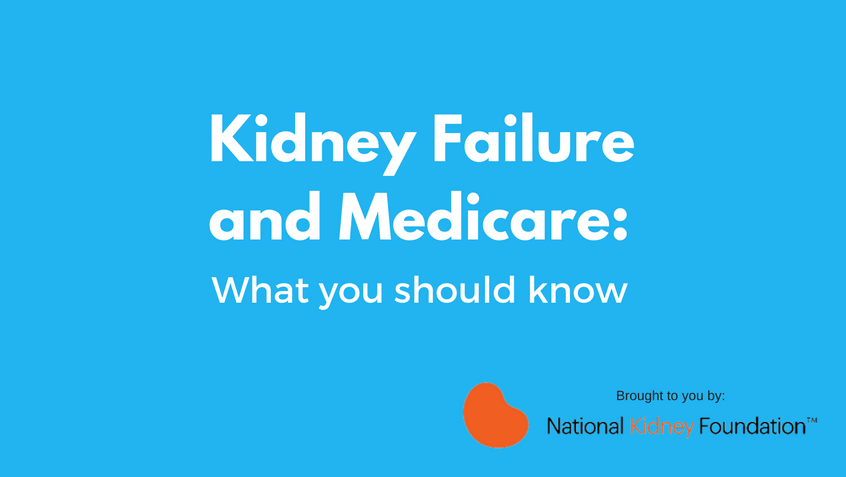Join Us Live for a Discussion on Medicare, Democracy, and the Future of Health Care
Kidney Failure and Medicare: What you should know

In 1972, Medicare benefits were extended to cover the high cost of medical care for most individuals suffering from permanent kidney failure also known as end-stage renal disease (ESRD). People whose kidneys have failed need dialysis or a kidney transplant to live. To this day, kidney failure is one of only two medical conditions that gives people the option to enroll in Medicare without a two-year waiting period, regardless of age. Because Medicare for people with ESRD was established separately and later, there are some specific rules around eligibility and coverage of Medicare for dialysis and transplant patients.
The following applies to people who receive Medicare ONLY because they have kidney failure. For those who are also eligible for Medicare based on age (over 65), or who have received Social Security Disability for 24 months, the following does not apply.
- People who need dialysis are not eligible to sign up for Medicare (Parts A and B) until the day they begin dialysis. Once they sign up, Medicare will be effective at the beginning of their fourth month of dialysis and will start paying for their treatment if they choose in-center hemodialysis. For those who start dialysis at home—either peritoneal dialysis or home hemodialysis—Medicare coverage is effective on their first day of dialysis treatment. Want to learn more about dialysis treatment options? Click here.
- Medicare also covers kidney transplants. After someone receives a successful kidney transplant, Medicare will continue to cover medical expenses for three years. Someone who receives a kidney transplant before needing to start dialysis (pre-emptive) can enroll in Medicare after the transplant and coverage will be retroactively effective to the day of the transplant. Three years after the successful transplant, Medicare coverage will end. People who receive a kidney transplant need to plan ahead to make sure they will have insurance coverage once their Medicare coverage ends.
- If someone has health insurance through their employer or their spouse’s employer, that insurance plan will be primary (pays first) for 30 months starting the day his or her dialysis begins. After that, Medicare pays first, and their employer health plan will pay second.
- People eligible for Medicare are generally not able to enroll in a Medicare Advantage plan, unless they had coverage from a plan owned by the same parent company prior to becoming eligible for Medicare.
- Medigap plans (supplemental Medicare polices) are not available to ESRD patients in all states. This means if someone does not have another plan that will pay after Medicare, he or she may not be able to purchase any other supplemental policy and will be responsible for paying all deductibles and coinsurance. Medicare patients are responsible for a 20% coinsurance on most out-patient care.
- People with ESRD can enroll in the Affordable Care Act Marketplace plans and receive tax credits and subsidies (if they are financially eligible), but only if they do not enroll in Medicare.
- If someone chooses not to enroll in Medicare he or she doesn’t have to but should not enroll in Part A without Part B. If they choose not to enroll in Medicare, they should not enroll in any part of Medicare.
To help kidney patients learn about their insurance options the National Kidney Foundation has developed a wealth of resources and tools.
For more answers to your questions on Medicare and ESRD, visit Medicare Interactive – powered by the Medicare Rights Center, the nation’s largest and most reliable independent source of Medicare information and assistance in the United States:
- Enrolling in Medicare for people with End-Stage Renal Disease (ESRD)
- Medicare due to End-Stage Renal Disease costs and coverage
- End-Stage Renal Disease Medicare and Medicare Advantage Plans
- End-Stage Renal Disease (ESRD) Medicare and work history
- The 30-month coordination period
- Enrolling in Medicare if you have employer based coverage
- Medicare due to End-Stage Renal Disease and Medicare due to age/disability. Who pays first?
- Coverage of immunosuppressant drugs and vitamins
- Ending Medicare for people with End-Stage Renal DiseaseChildren and End-Stage Renal Disease Medicare
Visit Medicare Interactive Pro to take a course on Medicare and ESRD.
Show Comments
We welcome thoughtful, respectful discussion on our website. To maintain a safe and constructive environment, comments that include profanity or violent, threatening language will be hidden. We may ban commentors who repeatedly cross these guidelines.
Help Us Protect & Strengthen Medicare
Donate today and make a lasting impact
More than 67 million people rely on Medicare—but many still face barriers to the care they need. With your support, we provide free, unbiased help to people navigating Medicare and work across the country with federal and state advocates to protect Medicare’s future and address the needs of those it serves.
The Latest
Most Read
Add Medicare to Your Inbox
Sign up to receive Medicare news, policy developments, and other useful updates from the Medicare Rights.
View this profile on InstagramMedicare Rights Center (@medicarerights) • Instagram photos and videos










One Comment on “Kidney Failure and Medicare: What you should know”
Jess T.
July 24, 2025 at 9:10 pmIt’s all so tricky to navigate. Finding the right provider ends up being such a small component of a bigger healthcare crisis: https://www.premiermedicalhv.com/divisions/services/kidney-infection/.